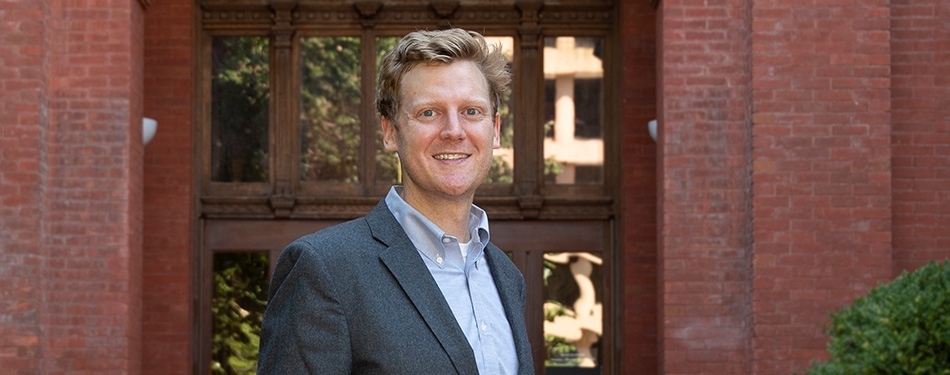Steven Schaus brings moral philosophy to research and teaching of torts at Michigan Law.
With a doctoral degree in philosophy from the University of Michigan and a law degree from Harvard Law School, Steven Schaus plans to dive into philosophical questions about the nature of law and the point of legal institutions, especially private law institutions like tort.
He recently stepped into a new teaching role as assistant professor of law at Michigan Law after completing a two-year postdoctoral fellowship at the Project on the Foundations of Private Law at Harvard.
In my research, I keep returning to questions about how we hold people accountable in everyday life…about how we do so through the law of torts, and about the relationship between the two activities.
“This is a genuine dream job for me, not least because Michigan is one of the very best places in the world to study law and philosophy,” Schaus said. “At the Law School alone, there are a half-dozen or more people doing important work at the intersection of law and philosophy, and there are several more doing the same work across the street in the philosophy department.”
Teaching torts as a foundation for legal study and practice
This fall, Schaus will teach a first-year course on torts, which he sees as a foundational building block for law students. His class will examine which wrongs receive attention and which do not―and why.
Schaus also sees torts as a course about judges and juries and about the relationship between courts and legislatures.
“This course will provide students with an introduction to questions about the law and legal institutions that they will be thinking about throughout law school and into their careers,” he said.
“I hope to leave students with the sense that tort law is not just a relic we study in the first year of law school and then set aside,” Schaus explained.
“It’s a practice that students can use to try to right today’s wrongs, too.”
In the future, he plans to offer classes in related subjects such as remedies and restitution, as well as in-depth courses dealing with philosophical questions about the law.
Schaus, who was an instructor at U-M during graduate school, said he looks forward to resuming his teaching role.
“I find the process of mentoring and advising students to be important and rewarding,” he said. “I enjoy being an advocate for students and helping them to achieve their goals.”
Exploring connections between legal institutions and morality
After law school, Schaus spent a year clerking for the Hon. Harry T. Edwards, J.D. ’65, of the U.S. Court of Appeals for the District of Columbia Circuit.
He then pursued the fellowship at the Project on the Foundations of Private Law.
“I found the legal questions I encountered in my clerkship fascinating, and I enjoyed the work a lot,” Schaus said. “But I was also excited to get back to work on questions about the philosophical underpinnings of the practice that we―the parties, the lawyers, the judges, and the clerks―were all engaged in.”
His recent work has focused on various tort doctrines, as well as other private law doctrines, in an effort to learn more about the connections between legal institutions and everyday moral concerns, and about the interactions between them.
“In my research, I keep returning to questions about how we hold people accountable in everyday life—by calling them out or expressing disappointment, for example—about how we do so through the law of torts, and about the relationship between the two activities,” Schaus said.
His scholarly papers have appeared or will appear in the Notre Dame Law Review, the Yale Law Journal Forum, and the Michigan Law Review.
In his most recent paper, Schaus proposes that some tort doctrines, like loss of consortium, seek to right wrongs that family members can suffer jointly.
“I think tort law has been picking up on this bit of our moral experience, even if that has not been widely appreciated,” he said. “Seeing tort law in this way leaves us with a richer understanding of what tort law is―and what it can be.”
―Claudia Capos

